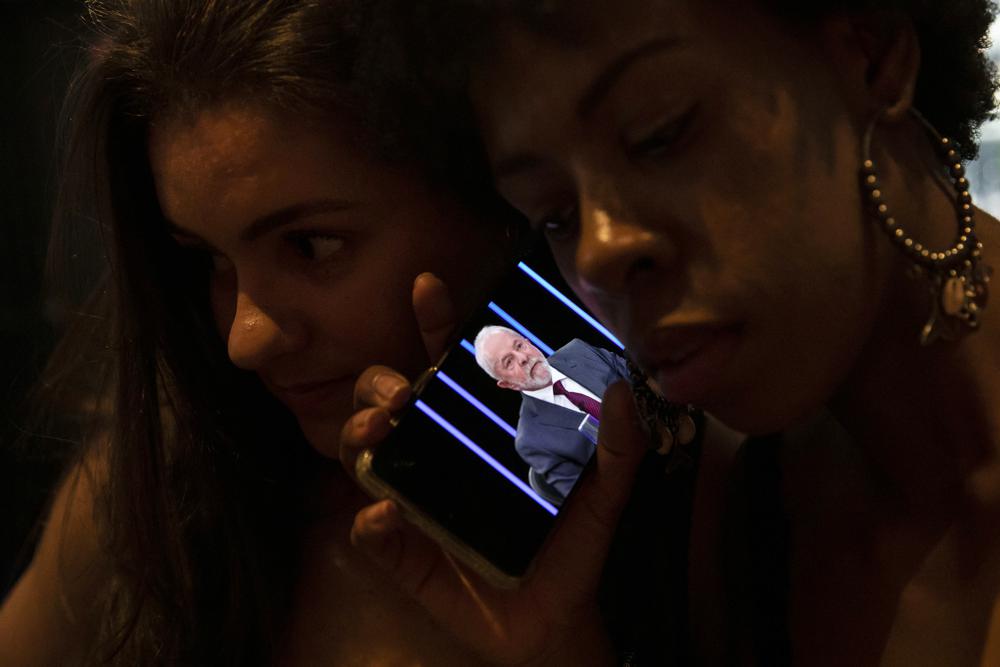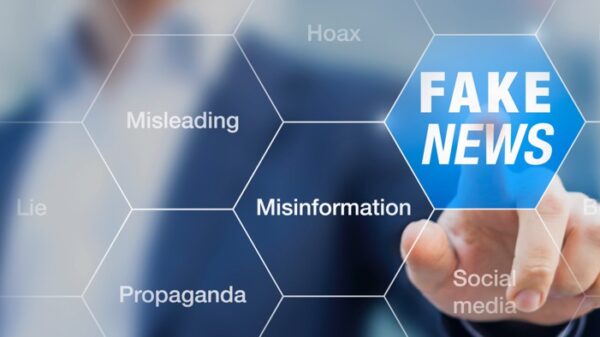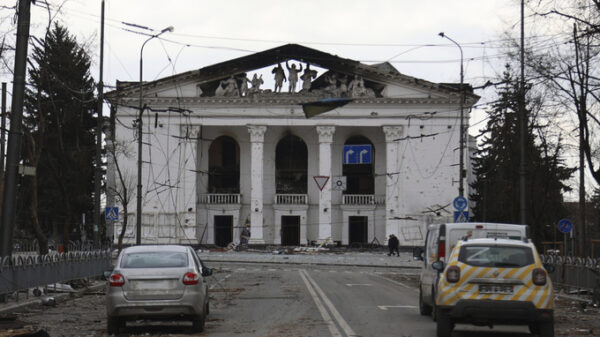FILE – Women listen on a mobile phone to an interview of former president Luiz Inacio Lula da Silva, who is running again for president, with Jornal Nacional on TV Globo, outside a bar in Rio de Janeiro, Brazil, Thursday, August 25, 2022. The Superior Electoral Court, the country’s top electoral authority, announced Thursday, Oct, 20, that it would be banning “false or seriously decontextualized” content that “affects the integrity of the electoral process.” No request from a prosecutor or complainant is necessary for the court to take action. (AP Photo/Bruna Prado, File)
RIO DE JANEIRO (AP) — Brazilian voters are being bombarded by online misinformation less than a week before they pick their next leader.
People on social media say, wrongly, that the leftist candidate in Brazil’s presidential election plans to close down churches if elected. There are lies that Luiz Inácio Lula da Silva wants to let men use public-school restrooms next to little girls. And they’re falsely alleging that right-wing President Jair Bolsonaro has made comments confessing to cannibalism and pedophilia.
Baseless and politically motivated rumors are whipping through social media in Latin America’s largest democracy, roiling Brazilian politics much as U.S. politics has been roiled. The onslaught of fake rumors helped prompt Brazil last week to enact what some experts call the strictest limits on speech in the country’s young democracy.
It’s a conundrum posed by social media across the world, especially in countries wrangling with the intersection between modern technology and free speech. Brazil has adopted a particularly heavy-handed approach. Experts say that in doing so, authorities have raised questions about the country’s commitment to free speech.
Brazil’s President Jair Bolsonaro, center, takes a photo with a supporter as he campaigns for reelection at rural workers’ settlement in Brasilia on Oct. 24. (AP Photo/Eraldo Peres)
“What is happening in Brazil, on Facebook, on YouTube and other platforms looks awfully similar to what was happening in the U.S. around the 2020 election,” said Vicky Wyatt, a campaign director at the U.S.-based activist group SumOfUs. “An individual post might not have that much reach, but cumulatively over time, having this constant drip-drip has negative consequences.”
Overall, conservative channels produce more content – and more false, problematic content, too. According to a tally by the Igarape institute, in the eight days before and after the Oct. 2 first-round vote, far-right YouTube channels attracted 99 million views while leftist channels had 28 million views. Political analysts and the opposition have expressed fears that Bolsonaro’s internet army may help him challenge the results if he loses, by spreading unfounded allegations of fraud.
The Superior Electoral Court, the country’s top electoral authority, announced Thursday that it would be banning “false or seriously decontextualized” content that “affects the integrity of the electoral process.” No request from a prosecutor or complainant is necessary for the court to take action.
In the days leading up to, and just after, the second round of the election on Oct. 30, social media companies like YouTube and Meta – owner of Facebook and Instagram – will be given just an hour, far less time than before, to remove problematic content. No company has commented.
Platforms that do not comply will face fines of up to 150,000 reals ($28,000) per hour and possibly be blocked on Brazilian servers for up to 24 hours.
Brazilian voters attacked by misinformation days before vote
By DIANE JEANTETyesterday

1 of 7
FILE – Women listen on a mobile phone to an interview of former president Luiz Inacio Lula da Silva, who is running again for president, with Jornal Nacional on TV Globo, outside a bar in Rio de Janeiro, Brazil, Thursday, August 25, 2022. The Superior Electoral Court, the country’s top electoral authority, announced Thursday, Oct, 20, that it would be banning “false or seriously decontextualized” content that “affects the integrity of the electoral process.” No request from a prosecutor or complainant is necessary for the court to take action. (AP Photo/Bruna Prado, File)
RIO DE JANEIRO (AP) — Brazilian voters are being bombarded by online misinformation less than a week before they pick their next leader.
People on social media say, wrongly, that the leftist candidate in Brazil’s presidential election plans to close down churches if elected. There are lies that Luiz Inácio Lula da Silva wants to let men use public-school restrooms next to little girls. And they’re falsely alleging that right-wing President Jair Bolsonaro has made comments confessing to cannibalism and pedophilia.
Baseless and politically motivated rumors are whipping through social media in Latin America’s largest democracy, roiling Brazilian politics much as U.S. politics has been roiled. The onslaught of fake rumors helped prompt Brazil last week to enact what some experts call the strictest limits on speech in the country’s young democracy.
It’s a conundrum posed by social media across the world, especially in countries wrangling with the intersection between modern technology and free speech. Brazil has adopted a particularly heavy-handed approach. Experts say that in doing so, authorities have raised questions about the country’s commitment to free speech.
Brazil’s President Jair Bolsonaro, center, takes a photo with a supporter as he campaigns for reelection at rural workers’ settlement in Brasilia on Oct. 24. (AP Photo/Eraldo Peres)
“What is happening in Brazil, on Facebook, on YouTube and other platforms looks awfully similar to what was happening in the U.S. around the 2020 election,” said Vicky Wyatt, a campaign director at the U.S.-based activist group SumOfUs. “An individual post might not have that much reach, but cumulatively over time, having this constant drip-drip has negative consequences.”
JAIR BOLSONARO
Brazil election: What to know about the high-stakes raceBrazil pol and Bolsonaro ally refuses arrest, injures policeBolsonaro struggles to sway Brazil’s poor voters with aidBrazil’s Lula issues letter to evangelicals to allay concern
Overall, conservative channels produce more content – and more false, problematic content, too. According to a tally by the Igarape institute, in the eight days before and after the Oct. 2 first-round vote, far-right YouTube channels attracted 99 million views while leftist channels had 28 million views. Political analysts and the opposition have expressed fears that Bolsonaro’s internet army may help him challenge the results if he loses, by spreading unfounded allegations of fraud.
The Superior Electoral Court, the country’s top electoral authority, announced Thursday that it would be banning “false or seriously decontextualized” content that “affects the integrity of the electoral process.” No request from a prosecutor or complainant is necessary for the court to take action.
In the days leading up to, and just after, the second round of the election on Oct. 30, social media companies like YouTube and Meta – owner of Facebook and Instagram – will be given just an hour, far less time than before, to remove problematic content. No company has commented.
Platforms that do not comply will face fines of up to 150,000 reals ($28,000) per hour and possibly be blocked on Brazilian servers for up to 24 hours.
Alexandre de Moraes stands as he is sworn in as the new head of Brazil’s electoral authority on Aug. 16. (AP Photo/Eraldo Peres, File)
The electoral tribunal’s president, Supreme Court Justice Alexandre de Moraes, said “the aggressiveness of this information and of hate speech” merits the measure. Prosecutor-General Augusto Aras, a Bolsonaro appointee who is widely considered a government ally, filed a motion with the Supreme Court to reverse measures that he said were unconstitutional. Aras said they amounted to “prior censorship,” infringing on the freedom of expression and the right to inform and to be informed in the Brazilian Constitution.
The Supreme Court will examine Aras’ request on Tuesday. The Brazilian Constitution’s take on freedom of expression is similar to that of the U.S. one, said Luis Claudio Araujo, a law professor at Ibmec University.
The tribunal also banned paid electoral advertising on the internet two days before, and a day after, the election.
The fresh measures angered many Bolsonaro supporters. Others said they were justified by the scale of the online dirty war.
Supporters carry a life-size image of Brazil’s President Jair Bolsonaro during a campaign rally on Oct. 24. (AP Photo/Eraldo Peres)
Misinformation has become more radical — and organized — since the 2018 presidential campaign, when far-right groups were accused of spreading mass disinformation in support of Bolsonaro.
“In 2018 it was a kind of playground thing. It was more honest, in the sense that they ideologically believed in what was happening and simply created channels as a way to be part of the conversation,” said Guilherme Felitti, founder of Novelo Data, which monitors more than 500 conservative YouTube channels.
Some of those have since turned their online activism into businesses, relying on ad revenues and donations from their growing audience. Some ran for office themselves this year.
Enzo Leonardo Suzi, better known under his YouTube alias Enzuh, was one of them. He launched his channels in 2015.
When Bolsonaro began his campaign, Suzi used his own YouTube channel and created several WhatsApp groups — including one he named “memes factory” — to target Bolsonaro’s perceived rivals — mayors, governors and even de Moraes, the Supreme Court Justice.
He has been found guilty and fined as much as 50,000 reais (just under $10,000) in five different defamation and libel lawsuits. He is also a target of a Supreme Court investigation into the spread of fake news online, which also include Bolsonaro and political allies.
Copyright 2021 Associated Press. All rights reserved.






























You must be logged in to post a comment Login